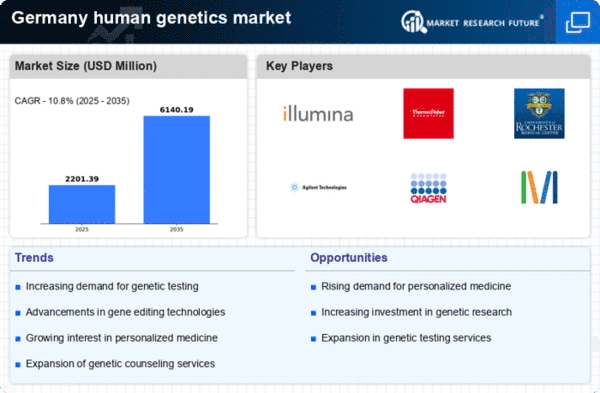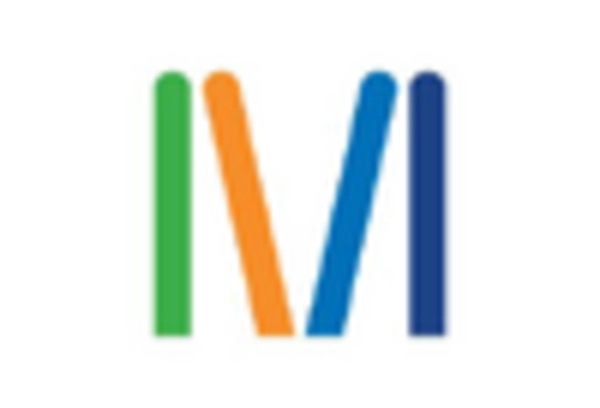Advancements in Bioinformatics
Advancements in bioinformatics are transforming the landscape of the human genetics market in Germany. The ability to analyze vast amounts of genetic data efficiently is crucial for the development of new therapies and diagnostic tools. In 2025, the bioinformatics market is projected to grow by approximately 15%, driven by the increasing need for data analysis in genetic research. This growth is likely to enhance the capabilities of the human genetics market, enabling researchers to derive meaningful insights from complex genetic information. As bioinformatics tools become more sophisticated, they will facilitate the identification of genetic markers associated with diseases, thereby improving diagnostic accuracy and treatment outcomes.
Rising Demand for Genetic Testing
The human genetics market in Germany experiences a notable increase in demand for genetic testing services. This surge is driven by a growing awareness of the benefits of early disease detection and personalized medicine. In 2025, the market for genetic testing is projected to reach approximately €1.5 billion, reflecting a compound annual growth rate (CAGR) of around 10% over the next five years. As more individuals seek genetic insights for health management, the human genetics market is likely to expand significantly. Furthermore, advancements in testing technologies, such as next-generation sequencing, enhance the accuracy and accessibility of genetic tests, further fueling this demand.
Government Initiatives and Funding
Government initiatives aimed at promoting research and development in genetics play a crucial role in shaping the human genetics market in Germany. The German government has allocated substantial funding, estimated at €200 million annually, to support genetic research and innovation. These initiatives encourage public-private partnerships, facilitating advancements in genetic technologies and therapies. As a result, the human genetics market is expected to witness increased activity in research projects and clinical trials, ultimately leading to the development of novel genetic solutions. This supportive environment is likely to attract both domestic and international investments, further bolstering the market.
Integration of Genomics in Healthcare
The integration of genomics into healthcare systems in Germany is a pivotal driver for the human genetics market. As healthcare providers increasingly adopt genomic data to inform treatment decisions, the market is poised for substantial growth. By 2025, it is estimated that over 30% of healthcare institutions in Germany will incorporate genomic information into their clinical practices. This shift not only improves patient outcomes but also encourages investment in genetic research and development. Consequently, the human genetics market is likely to benefit from enhanced collaboration between healthcare providers and genetic researchers, fostering innovation and expanding service offerings.
Growing Interest in Personalized Medicine
The human genetics market in Germany is significantly influenced by the rising interest in personalized medicine. Patients and healthcare providers are increasingly recognizing the value of tailored treatment plans based on genetic profiles. This trend is expected to drive the market's growth, with projections indicating that personalized medicine could account for over 25% of total healthcare expenditures by 2025. The human genetics market is likely to benefit from this shift, as pharmaceutical companies and biotech firms invest in developing targeted therapies. Additionally, the collaboration between geneticists and clinicians is expected to enhance the efficacy of treatments, further solidifying the market's position.
















